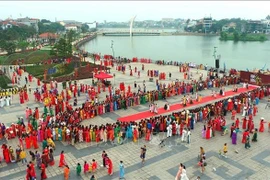 State President Vo Van Thuong and officials offer incense to the Hung Kings at the special national historical relic site of the Hung Kings Temple in Phu Tho province on April 29. (Photo: VNA)
State President Vo Van Thuong and officials offer incense to the Hung Kings at the special national historical relic site of the Hung Kings Temple in Phu Tho province on April 29. (Photo: VNA)The ceremony washeld at Kinh Thien Palace on Nghia Linh Mountain, part of the special national historicalrelic site of the Hung Kings Temple.
Reading the eulogy, Chairman of thePhu Tho People’s Committee Bui Van Quang expressed the Vietnamese people’s deepgratitude to the Hung Kings, who established Van Lang – the first state inVietnam’s history, and other ancestors who defended the country. He alsoreported on the country’s enormous achievements in reforms, integration, anddevelopment.
After that, Party and State leadersoffered incense at the Tomb of Hung Kings and laid wreaths at a sculpted reliefdepicting then President Ho Chi Minh talking to officers and soldiers of theTien Phong Division at the Gieng Temple on September 19, 1954, where he said: “TheHung Kings established the country, we must together safeguard it.”
On this occasion, the provinces andcities housing temples dedicated to the Hung Kings and generals from the kings’era also held ceremonies to commemorate the legendary founders of Vietnam.
Legend has it that Lac Long Quan (real name Sung Lam, son ofKinh Duong Vuong and Than Long Nu) married Au Co (the fairy daughter of DeLai). Au Co then gave birth to a pouch filled with 100 eggs,which hatched into a hundred sons. However, soon thereafter, Lac Long Quan andAu Co separated. Lac Long Quan went to the coast with 50 of the children, whileAu Co went to the highlands with the rest.
Their eldest son was made king, who named the country Van Lang and set up thecapital in Phong Chau (modern-day Viet Tri city in Phu Tho province), beginning the 18 reigns ofthe Hung Kings.
The kings chose Nghia Linh Mountain, the highest in the region, to performrituals devoted to rice and sun deities to pray for bumper crops.
To honour their great contributions, a complex of temples dedicated to them wasbuilt on Nghia Linh Mountain, and the 10th day of the third lunar month servesas the national commemorative anniversary for the kings.
The worship of the Hung Kings, closely related to the ancestral worshiptraditions of most Vietnamese families, was recognised as part of the IntangibleCultural Heritage of Humanity by UNESCO in 2012./.






























